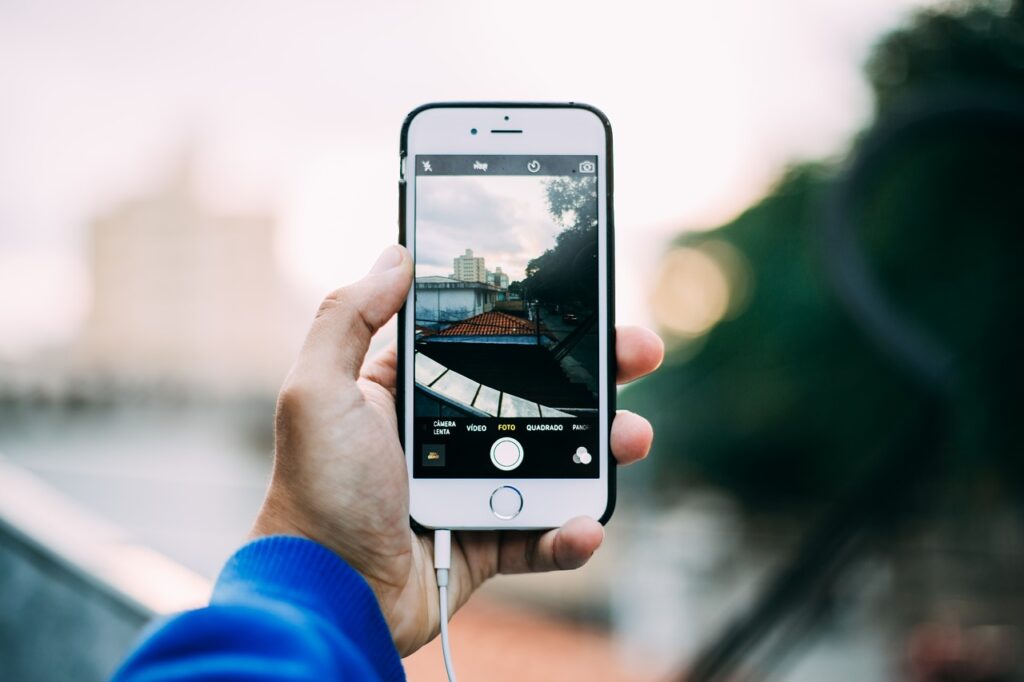Is technology damaging your mental health and wellbeing?
Wherever we go, we see people with their heads down, doing something on their phone, laptop or tablet. Our brains are busier than ever before with smart devices. We are doing the jobs of 10 different people while still trying to keep up with our lives, our children and parents, our friends, our careers, our hobbies, and our favourite TV shows. Our smartphones have become our dictionary, calculator, web browser, messaging service, appointment calendar, voice recorder, keyboard tuner, weather forecaster, GPS etc. And that’s without even mentioning the vast social media landscape.
We use our devices all the time, cramming everything we do into every single spare moment of downtime. We text while we are walking across the street, catch up on email while standing in a queue. We write our shopping lists on smartphones, whilst at the same time listening to that informative podcast.
Everything is online. Even when we need to see a doctor, we have to go online for an appointment and our rest time is spent with activities on screens.

Before mobile phones arrived, if the phone rang and we were busy, we would not answer it. There was no expectation of being able to reach us at all times, so if someone could not reach you (or you didn’t feel like being reached), it was considered normal. Mobile phones have created an implicit expectation that you should be able to reach someone when it is convenient for you, regardless of whether it is convenient for them or not.
Science says multitasking is bad for our brain
Earl Miller, a neuroscientist and one of the world’s experts on divided attention, says that our brains are not wired to multitask. When people think they’re multitasking, they’re actually just switching from one task to another very rapidly. He adds, “People can’t do [multitasking] very well, and when they say they can, they’re deluding themselves.”
Is this you?
“Excuse me, I have to take this call. I’ll be back right after I check my e-mails, see what updates I have on Facebook, LinkedIn and Twitter, decide what to buy for my friend’s birthday, check to see if the post has arrived, and listen to the cricket scores. No problem, right? Now, where was I? Oh, yeah, what about that new phone that lets me download my apps faster than ever and that little online news feed in the corner of my computer that’s keeping me up-to-date?”
I invite you to try this exercise that will help to reinforce the point I am trying to make.
First, count to 10 as fast as possible. Secondly, recite the alphabet from A to J as quickly as possible. Note the time taken with both separately.
Next, alternate between the two lists (A, 1, B, 2, C, 3, D, 4, etc.) Note time taken in seconds.
You’ve probably discovered that it takes longer when you try to multitask. The brain needs a certain amount of time for switching. When you leave one task, then come back to it later, it takes the brain a while to readjust. Those extra seconds add up when you are constantly switching back and forth. They can add considerably to the amount of time devoted to each task hence bottlenecks are created. This is essentially the same thing that happens to your computer when you have too many windows open at the same time. The time required for switching accumulates to the point that the computer slows down and you have to reboot.

In the same way, Every time this happens to our brains, there’s a cognitive cost, which is impacting on our mental wellbeing. Multitasking has been found to increase the production of the stress hormone cortisol as well as the fight-or-flight hormone adrenaline, which can overstimulate and weaken our brain. The stress hormone cortisol in the brain can lead to aggressive and impulsive behaviour.
Just having the opportunity to multitask is detrimental to cognitive performance. Glenn Wilson, former visiting professor of psychology at Gresham College, London, calls it info-mania. His research found that being in a situation where you are trying to concentrate on a task, and an email is sitting unread in your inbox, can reduce your effective IQ by 10 points.
Russ Poldrack, a neuroscientist at Stanford, found that learning information while multitasking causes the new information to go to the wrong part of the brain. If students study and watch TV at the same time, for example, the information from their schoolwork goes into the striatum, a region specialised for storing new procedures and skills, not facts and ideas. Without the distraction of TV, the information goes into the hippocampus, where it is organised and categorised in a variety of ways, making it easier to retrieve.
To make matters worse, lots of multitasking requires decision-making: Do I answer this text message or ignore it? How do I respond to this? How do I file this email? Do I continue what I’m working on now or take a break? It turns out that decision-making is also very hard on your neural resources and that little decisions appear to take up as much energy as big ones. Therefore, after making lots of insignificant decisions, we can end up making truly bad decisions about something important. Why would you want to add to your daily weight of information processing by trying to multitask?
Email overload
In discussing information overload with Fortune 500 leaders, top scientists, writers, students, and small business owners, email comes up again and again as a problem. I am not objecting to email itself, it’s the excessive number of emails that come in which can be overwhelming. We feel obliged to answer our emails, at the cost of other important tasks as well as taking away essential time to attend to our wellbeing.
Before email, if you wanted to write to someone, you had to invest some effort and a lot of thought in it. We didn’t go to the trouble unless we had something important to say. Because of email’s immediacy, most of us give little thought to typing up any little thing that pops in our heads and hitting the send button. And email doesn’t cost anything.
Before email, the only mail we got came once a day into our letterbox, where we set aside a small amount of time to deal with it and there was no expectation that you would act on it immediately. Now email arrives continuously, and most emails demand some sort of action.
This uncertainty wreaks havoc, causes stress, and leads to decision overload. Every email requires a decision! Do I respond to it? If so, now or later? How important is it? What will be the social, economic, or job-related consequences if I don’t answer, or if I don’t answer right now?
Text and social media
Next came the text and social media platforms. You can attach documents, photos, videos, and links to your text messages.
There are similarities and differences with texting and emails. Because texts are limited in characters, it discourages thoughtful discussion or any level of detail. Emails take some time to work their way through the internet and they require that you take the step of explicitly opening them. Text messages magically appear on the screen of your phone and demand immediate attention from you.
Each time we dispatch an email in one way or another, we feel a sense of accomplishment, and our brain gets a dollop of reward hormones telling us we accomplished something. Each time we check a Twitter feed or Facebook update, we encounter something novel and have the perception of feeling more connected socially triggering a sense of false reward in our brains. Constantly checking email and social media messages can lead to a neural addiction.

We can argue that given the current challenges that the world is facing, technology is keeping us connected with our loved ones, enabling us to work from home, helping us with essentials such as groceries, providing information and entertainment to keep our spirits up. It is a lifeline for many of us in ways that was unimaginable a few decades ago.
However, it is the overuse of this resource can cause stress in many ways and is detrimental on our brains and mental health. Too much of anything cannot be good for us. It is hard to keep the boundaries to our consumption of social media when we are bombarded with information from multiple social media channels. As new ones emerge it feeds into our curiosity and before we know it we are trying to juggle with multiple channels of information and messages
How can we avoid this overuse?
Switch off from the 24/7 availability
Turn off notifications: this stops the desire to immediately respond to the need to constantly be connected online. Develop the discipline to switch off your laptop, tablet and phone. Instead, engage in activities that do not require screen time, such as reading, gardening, knitting etc. Inform your social circle that there will be certain times that you will not be available except for emergencies. Have regular breaks from the constant ping of incoming messages which keeps you in a constant arousal state that can impact on well-being in the long term.
Preserve your self-esteem
Our sense of self can be challenged by the relentless pressure to both seek approval from others online and construct a ‘brand’ image on the outside that is at odds with our inner life. Many people experience a distorted sense of reality from images of perfection on social media and strive to keep up – feeling inadequate and empty when they don’t receive enough likes to their posts.
There’s not much room for reasoned debate or consensus online, often presenting the perception of perfection and rewarding those who shout loudest with likes.
Technology and young people.
Be aware of what your child is viewing or accessing online. We wouldn’t allow a young person to drive a car without knowing the dangers of the road, yet we allow our children to go online often with the risk that they could stumble upon disturbing or violent content. Model good behaviour to your children by not glancing at your phone at mealtimes constantly or taking your phone to bed with you. Talk about the benefits of doing so – a better night’s sleep and more meaningful interaction
Make the effort to meet people face to face
It is our intrinsic need as humans for face-to-face eye contact and skin-to-skin connection. While the connectedness of being online creates an illusion of being closer together, it is no substitute for being in the physical space with a loved one and experiencing their energy through their voice, touch, gaze and hugs. Playing sport, having a coffee with friends, walking the dog – it seems obvious but the more meaningful interaction we have with people in the non-virtual world, the more nourished and resilient we feel.
Have meaningful conversations instead of texting
A quick text can be used as an excuse to resist interacting with significant others, avoiding confrontation and important conversations. An email or text does not have room for meaningful conversations that flow and stimulate the mind. The avoidance of meaningful conversations, difficult though they can be sometimes can lead to misunderstandings and relationship breakdowns.
We need to talk more as it may in the short term, be easier to retreat behind a screen than face up to the everyday difficulties of life. Therefore, it is important to have face-to-face conversations, where opinions and doubts can be aired and solutions can be reached.
To conclude, we can say that although technological devices such as mobile phones and laptops have their uses and make life easier in some ways, overuse can seriously impact on our brain function, mental health and eventually our wellbeing. It makes sense, therefore, to limit their use for essential tasks only and switch off from them at regular times in the day. It is essential to set a good example to children and young adults by doing so in their presence and taking up more off-screen activities such as playing a sport, reading, sewing etc. In addition, encourage meaningful conversations by making the effort to meet up with friends and family face to face.
About Hansa Pankhania
Hansa Pankhania is a published author of 10 Wellbeing books for adults and children available on Amazon or through her website. In her books, she is passionate about sharing natural wellbeing techniques which do not cost anything but nourish your body, mind, and soul in powerful ways.
She is a Speaker and Founder of AUM WELLBEING CONSULTANCY which offers personal and corporate wellbeing solutions.
In her books, STRESS TO SUCCESS IN 28 DAYS and STRESS TO SUCCESS STORIES, she is passionate about sharing natural wellbeing techniques which are cost free, easy-to-implement but nourish your body, mind, and soul in powerful ways.
Her CHAKRAJI CHILDRENS RELAXATION SERIES OF BOOKS passes natural wellbeing tips to primary age children using colourful illustrations.
She has also published her memoir BEST OF THREE WORLDS about being born in Kenya as a British subject of Indian origin and the fusion of three histories and cultures. She is currently writing a sequel, BEST OF ONE WORLD – my 50 steps to a sustainable, meaningful and joyful life, which will be published in October 2023.
Visit-www.aumconsultancy.co.uk
Text- +449(0)7888747438
Contact us at +44(0)7888747438

